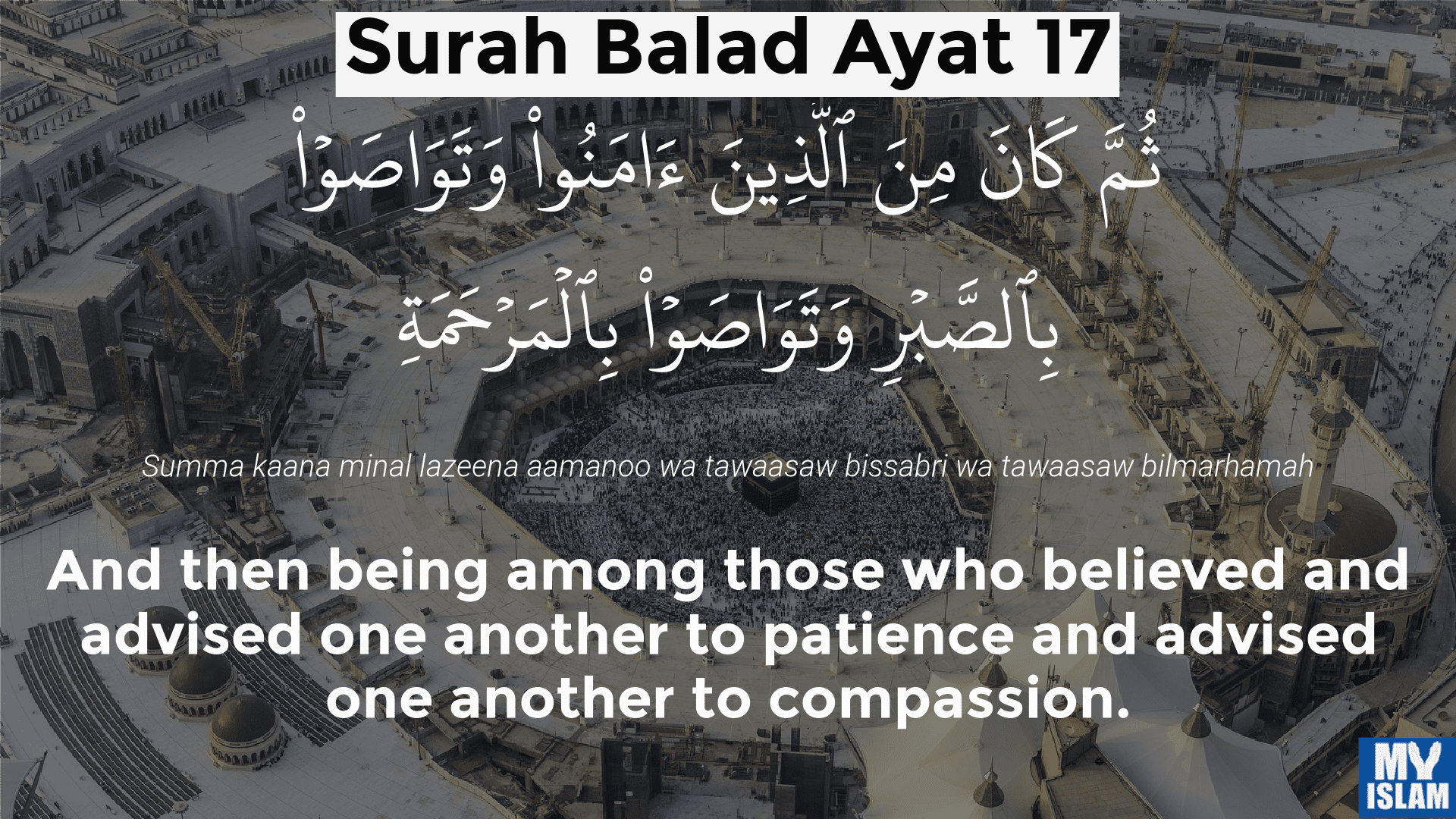Surah Balad Ayat 17 in Arabic Text
English Translation
Here you can read various translations of verse 17
And then being among those who believed and advised one another to patience and advised one another to compassion.
Then will he be of those who believe, and enjoin patience, (constancy, and self-restraint), and enjoin deeds of kindness and compassion.
and, then besides this, he be one of those who believed, and enjoined upon one another steadfastness and enjoined upon one another compassion.
Then he became one of those who believed, and recommended one another to perseverance and patience, and (also) recommended one another to pity and compassion.
And to be of those who believe and exhort one another to perseverance and exhort one another to pity.
Thereafter he is one of the ones who believed, and enjoined one another to have patience, and enjoined one another to do merciful deeds.
and to be one of those who believe and urge one another to steadfastness and compassion.
پھر ان لوگوں میں سے ہو جاتا جو ایمان ﻻتے اور ایک دوسرے کو صبر کی اور رحم کرنے کی وصیت کرتے ہیں
Quran 90 Verse 17 Explanation
For those looking for commentary to help with the understanding of Surah Balad ayat 17, we’ve provided two Tafseer works below. The first is the tafseer of Abul Ala Maududi, the second is of Ibn Kathir.
Ala-Maududi
(90:17) and, then besides this, he be one of those who believed,[13] and enjoined upon one another steadfastness and enjoined upon one another compassion.[14]
13. That is, in addition to these qualities it is essential that one should be a believer, for without faith no act is an act of virtue, nor acceptable in the sight of Allah. At numerous places in the Quran it has been stated that only such an act of virtue is appreciable and becomes a means of salvation as is accompanied by faith. In Surah An-Nisa, for example, it has been said: The one who does good deeds, whether man or woman, provided that the one is a believer, will enter Paradise (Surah An-Nisa, ayat 124). In Surah An-Nahl: Whosoever does righteous deeds, whether male or female, provided that he is a believer, We shall surely grant him to live a pure life in this world, and We will reward such people (in the Hereafter) according to their best deeds (Surah An-Nahl, ayat 97). In Surah Al-Momin: Whoever does good, whether man or woman, provided that he is a believer, all such people shall enter Paradise wherein they shall be provided without measure. (Surah Al-Momin, ayat 4). Whoever studies the Quran, will see that in this Book wherever the good reward of a righteous act has been mentioned, it has always been made conditional upon the faith, a good act without faith has nowhere been regarded as acceptable to God, nor has any hope been given for a reward for it.
Here, the following important point should also not remain hidden from view: In this verse it has not been said: Then he believed, but: Then being among those who have believed. This means that mere believing as an individual and remaining content with it is not what is desired; what is desired is that every new believer should join those who have already believed so as to form a party of the believers, to bring about a believing society, which should work for establishing the virtues and wiping out the vices as demanded by the faith.
14. These are two of the important characteristics of the believing society, which have been expressed in two brief sentences. The first characteristic is that its members should exhort one another to patience, and the second that they should exhort one another to compassion and mercy.
As for patience, we have explained at many places that in view of the extensive meaning in which the Quran has used this word, the entire life of a believer is a life of patience. As soon as a man steps on to the path of the faith, test of his patience starts. Patience is required to be exercised in performing the acts of worship enjoined by Allah; patience is needed in carrying out the commands of Allah; abstention from the things forbidden by Allah is not possible without patience; patience is needed in abandoning the moral evils and in adopting the pure morals. Temptations to sin faced at every step can be resisted only by recourse to patience. On countless occasions in life obedience to God’s law entails losses, troubles, hardships and deprivations, and disobedience to the law seems to bring benefits and pleasures. Without patience no believer can fare well on such occasions. Then, as soon as a believer has adopted the way of the faith, he has to meet with resistance not only from his own self and personal desires but also from his children, family, society, country and nation, so much so that he is even required to abandon his country and undertake Jihad in the cause of God. Under all these conditions only the quality of patience can cause a man to remain steadfast to principles. Now, obviously, if every believer individually was put to such a hard test, he would be faced with the danger of defeat at every step and would hardly be able to pass through the test successfully. On the contrary, if there existed a believing society, every member of which was not only himself possessed of patience but all its members also were supporting one another mutually in the test of patience, successes would fall to its lot, a tremendous power would be generated to face the evil, a mighty force of good individuals would be ready to help bring the entire society on to the path of virtue and righteousness.
As for mercy and compassion, it is the distinctive feature of the society of believers that they are not a merciless and unjust people but a society whose members are merciful and compassionate to humanity at large and sympathetic and friendly among themselves. A believer as an individual is an embodiment of Allah’s quality of mercy and the group of the believers as a party also is a representative of Allah’s Messenger (peace be upon him), who has been described thus: O Muhammad (peace be upon him), We have sent you to be a real blessing for the people of the world. (Surah Al-Anbiya, Ayat 107). The highest moral quality which the Messenger (peace be upon him) tried his utmost to inculcate among his followers was this very quality of mercy. Consider the following of his sayings, which show what importance he attached to it. Jarir bin Abdullah says that the Messenger (peace be upon him) said: Allah does not show mercy to him who does not show mercy to others. (Bukhari, Muslim).
Abdullah bin Amr bin al-aas says that the Prophet (peace be upon him) said: The Rahman (Merciful) shows mercy to those who show mercy (to others). Show mercy to those who live on the earth, the One who is in heaven will show mercy to you. (Abu Daud, Tirmidhi).
Abu Saeed Khudri has reported that the Prophet (peace be upon him) said: The one who does not show mercy, is not shown mercy. (Bukhari in Al-Adab al-Mufrad). Ibn Abbas says that the Prophet (peace be upon him) said: The one who does not treat our young ones mercifully and does not treat our elderly ones respectfully, does not belong to us.(Tirmidhi).
Abu Daud has related this same saying of the Prophet (peace be upon him) on the authority of Abdullah bin Amr, thus: The one who did not feel pity on our young and did not respect our elderly does not belong to us.
Abu Hurairah says: I have heard Abul-Qasim, the truthful (peace be upon him), say: The heart of the wretched one is deprived of the quality of mercy altogether. (Musnad Ahmad, Tirmidhi).
Iyad bin Himad relates that the Prophet (peace be upon him) said: Three kinds of men belong to Paradise, one of whom is the person who is kind and compassionate to every relative and every Muslim. (Muslim).
Numan bin Bashir has reported that the Prophet (peace be upon him) said: You will find the believers like a body in the matter of mutual kindness, love and sympathy, so that if one part of the body suffers the whole body suffers and becomes restless because of it. (Bukhari, Muslim).
Abu Musa al-ashari says that the Prophet (peace be upon him) said: The believer is for the other believer like a wall each part of which supports and strengthens the other part. (Bukhari, Muslim).
Abdullah bin Umar has reported that the Prophet said: A Muslim is a brother of the other Muslim: neither treats him unjustly, nor withholds his help from him. The person who works to fulfill a need of his brother, Allah will seek to fulfill his need; and the one who rescues a Muslim from an affliction, Allah will rescue him from an affliction of the afflictions of the Resurrection Day; and the one who conceals the fault of a Muslim, Allah will conceal his fault on the Resurrection Day. (Bukhari, Muslim).
These traditions indicate what kind of a society is envisaged by the Quranic instruction given in this verse, which exhorts the righteous people to join the group of the believers after they have affirmed the faith.
Ibn-Kathir
The tafsir of Surah Balad verse 17 by Ibn Kathir is unavailable here.
Please refer to Surah Balad ayat 11 which provides the complete commentary from verse 11 through 20.
Quick navigation links






